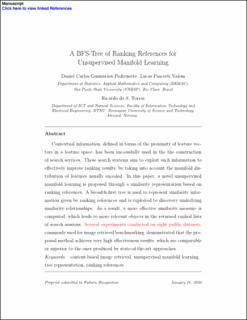A BFS-Tree of ranking references for unsupervised manifold learning
Journal article, Peer reviewed
Accepted version
Permanent lenke
https://hdl.handle.net/11250/3027769Utgivelsesdato
2021Metadata
Vis full innførselSamlinger
- Institutt for IKT og realfag [597]
- Publikasjoner fra CRIStin - NTNU [38127]
Originalversjon
10.1016/j.patcog.2020.107666Sammendrag
Contextual information, defined in terms of the proximity of feature vectors in a feature space, has been successfully used in the construction of search services. These search systems aim to exploit such information to effectively improve ranking results, by taking into account the manifold distribution of features usually encoded. In this paper, a novel unsupervised manifold learning is proposed through a similarity representation based on ranking references. A breadth-first tree is used to represent similarity information given by ranking references and is exploited to discovery underlying similarity relationships. As a result, a more effective similarity measure is computed, which leads to more relevant objects in the returned ranked lists of search sessions. Several experiments conducted on eight public datasets, commonly used for image retrieval benchmarking, demonstrated that the proposed method achieves very high effectiveness results, which are comparable or superior to the ones produced by state-of-the-art approaches.

